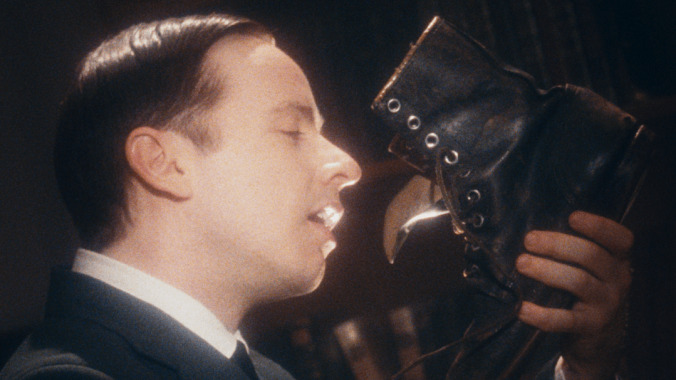The Twentieth Century spruces up history with ejaculating cacti and Python-style hilarity

Academic consensus credits Scottish philosopher Thomas Carlyle as the originator of the “great man theory” of history, a 19th-century notion that the course of nations is shaped by the influence of a select handful of heroes. By Carlyle’s reasoning, figures of exceptional power, courage, intellect, and moral fiber dictate the world’s most major developments, and culture traces itself from the outline of their towering shadows. With his new film The Twentieth Century, a biopic of Canadian Prime Minister William Lyon Mackenzie King in only the loosest imaginable sense, writer-director Matthew Rankin suggests an alternative best described as the “gigantic loser theory” of history. Through a hysterically surreal perversion of a pathetic nonhero’s ascent to office, a more critical image of the Great White North’s character takes form. It is informed in no small part by furious masturbation.
Posterity reveres King for the poise with which he steered Canada through World War II, painting him as a noble statesman to stand comparison with Roosevelt and Churchill. Rankin’s revisionist biography drowns the factual record in cactus jizz and styles the novice politician (played with unraveling primness by Dan Beirne) as a petulant, effete, entitled, obsequious little twerp with a boot-sniffing fetish and a streak of sexual anxiety several kilometers long. The broad contours of the truth guide the plot, with its particulars garbled through a hallucinatory aesthetic equal parts German Expressionism, Monty Python, and state-sponsored propaganda. King’s well-documented preoccupation with his mother (Guy Maddin regular Louis Negin in cheap drag, a symbol of the creative debt Rankin owes his fellow Winnipegger) takes on a demented Oedipal edge, one key figure’s 1901 drowning turns into a narwhal tusk impalement, and the electoral process consists of a parade of absurdities and humiliations.
One uproarious montage speeds through the trials of caricatured Canuck manhood used to test prospective PMs: baby-seal-clubbing, snowbank-urination, waiting your turn. But King’s own erections constitute the chief obstacle keeping him from his governmental destiny. He wants to be the upstanding picture of patriotism that a cherubic sick-ward moppet sees him as in the opening minutes (“When you’re Prime Minister, will you make tuberculosis against the law?” she coughs), an image that clashes harshly with his secret footwear-related depravities and the ejaculating saguaro he hides in his bedroom. So he embarks upon a mission to tame and repress his urges with the help of sadistic doctor Milton Wakefield (Kee Chan), who engages in some light urethral sounding and outfits him with a chastity cage that rings a loud bell whenever it senses arousal. This only results in further anguish, the exquisite terror of being found out proving a more potent aphrodisiac than anything else.
King’s sweaty efforts to control his own unruly libido coincide with a more grandly scaled campaign for Canada to impose order on itself. To whatever extent a script this anarchically arranged can be said to contain subplots, a big one concerns the Boer War and the Québécois resistance to what was seen as a British-Canadian project in South Africa. The French-speaking population appears as a diminutive rosy-cheeked people clad in mint-green jackets, led by the mustachioed female separatist J. Israël Tarte (Annie St-Pierre, one in a number of castings playing on gender and race), an existential threat to the reign of the mad Governor General Lord Muto (Seán Cullen) that the royal loyalist must use King to quash. Comedic set pieces at once puerile and sophisticated reverberate outward, their immediate currents and implied far-reaching consequences lending the film its epochal title.
Rankin’s ambitious thesis on how idiocy, horny neuroses, and pure chance come to sculpt the geopolitical narrative never gets bogged down by the social-studies minutia. He throws one dazzling diversion after another at his audience: the occasional musical number, a detour to visit the “fleshpots of Winnipeg” in their community-theatre-grade Sodom, a speed-skating climax through a hall of mirrors. Every frame’s a marvel, an inverted-triangle-shaped window into a dimension of glass mattes and forced perspective, animated interludes and animatronic puppetry, sumptuous 16mm photography and intervals of Super 8. The production design, wholly original even as it alludes to everything from Reiniger’s shadows to Expo 67 Montreal’s Pulp And Paper Pavilion, is the best cinematic thing to happen to the color blue since 1993’s Blue.
This exemplary use of CanCon funding first premiered right at home in the Toronto International Film Festival’s Midnight section, where movies this strange aren’t often so formally rigorous or intellectually curious, and movies this dense aren’t often so unrelentingly fun. Rankin has given a rare, precious gift to fringe-trawlers starved for the next worthy cult film, its sick salaciousness supported by substance. King’s bed-ridden harpy of a mother puts it best: “I think my bowels may explode. You know how unaccustomed I am to happiness.”